2.1 Introduction
As I explained in the previous chapter, public inquiries are a not uncommon feature of civic life which under the Inquiries Act (2005) are commissioned by the sitting Prime Minister or the appropriate Secretary of State (or their equivalent in the devolved nations and regions). This was a change from the Tribunals of Inquiry (Evidence) Act (1921) which allowed for backbench Members of Parliament (MPs) to call a vote on a proposal for an inquiry—now the decision to hold a public inquiry lies entirely in the hands of the Executive. The effect of this shifting of power to the government is something which we shall explore in this chapter.
The nature and conduct of public inquires depends greatly on the panel chosen to conduct it and is particularly determined by its chair1 who has the authority to carry out the investigation in any way s/he chooses. The chair of the inquiry is usually a senior judge, a (former) civil servant or an expert in the field. A further feature which separates a public inquiry from another type of formal investigation into (potential) wrongdoing is its independence from government (once it is established at least) and its ability to call any witness of the chair’s choosing.
Given the often controversial nature of events deemed to merit such formal investigation, it should be unsurprising that the establishment of an inquiry may be resisted and/or vociferously campaigned for. The first section of this chapter will explore how parliamentarians lobby for and argue against the instituting of a public inquiry and how these debates play into the discourse of blame.
I then consider the timing of inquiries and how this relates to the events themselves and the lobbying for such an investigation (Sect. 2.3).
In Sect. 2.4, I move on to outlining the formal means by which an inquiry is established, through a written or oral statement in the House of Commons.
From these procedural aspects, I discuss in Sect. 2.5 the first steps that an inquiry takes once it has been set up by the minister responsible. In particular, I will consider how ministers justify their choice of chair (and other members of the panel) and why this process—which I shall call legitimisation—is carried out at all.
In addition to this, I will outline how the Terms of Reference for an inquiry—a result of negotiation between the minister responsible and the chair—frame the public inquiry and how it will proceed. I also consider the verbal semantics of such Terms of Reference in Sect. 2.6.
Through these discussions I hope to shed light on the processes involved in the establishment of a public inquiry. In addition, I seek to demonstrate that the current processes are unsatisfactory as a means for members of the public to seek justice and get to the truth, since they are, for the most part, excluded from the processes.
2.2 Seeking an Inquiry
When it comes to seeking a public inquiry, I have noted that campaigns are often launched and are multi-faceted, such that pressure is brought to bear on politicians through the media, grassroots campaigns and petitions, as well as through questioning and debates in parliament. It is these latter two avenues for seeking an inquiry which I shall take up here.

Parliamentary activity and the pressure felt by the government to establish an inquiry
I come to this cline on the basis of (i) how public the activities are and, related, (ii) how easy the calls are for the minister to provide a negative response to. Whilst there has been a great deal of work on how the government seeks to persuade (see amongst many others Charteris-Black (2011, 2014) and chapters in Mutz et al. (1996)), there has been far less done on what persuades the government. I seek to explore this in relation to lobbying for a public inquiry and provide examples of each type of (parliamentary) action which can be used to this end.
2.2.1 Written Questions
Written questions (or more formally, ‘Questions for written answer’) are exactly that—questions asked of a minister by an MP which will be responded to in writing. An MP can ask for the question to be answered by a particular day, but that does not guarantee an answer is substantive in nature—indeed a frequent response to such questions is that they ‘will be answered as soon as possible’. There is a general expectation that an answer will be provided in 7 days, but there is nothing to enforce this, or to ensure that a question is answered in a substantive way. In other words, the Speaker of the House of Commons does not police the content of written answers.
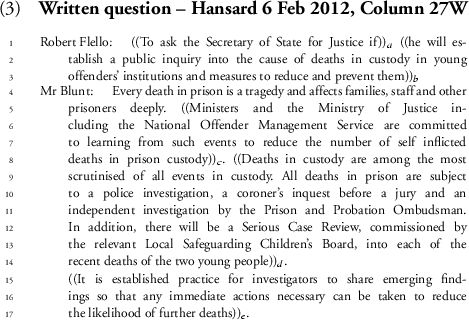
The first point to note here is that the opening of the question (extract a) is, as we will see later with other aspects of parliamentary language, a set formula which has to be followed in order for the question to be tabled. Also noteworthy when it comes to my argument about the pressure felt by the government is that whilst the question is asked of the Secretary of State (i.e. the most senior minister in the particular government department), it is usual that it will be answered by the junior ministers in the department. As such, the call for an inquiry can, to some extent, be ignored by those with the power to establish such an inquiry—indeed, it may be that the call is not even seen by the Secretary of State meaning little pressure is brought to bear by the written question.
- i.
not offer or seek expressions of opinion
- ii.
not convey information nor advance a proposition, an argument or debate (Millar et al. 2011: 345ff.)
This means that whilst the MP can press for action for an inquiry, she cannot submit a question which gives reasons for why she thinks the inquiry is necessary, nor can she give information about the victims’ desire for an inquiry. I would argue that rejecting a request for an inquiry which does not invoke those who it will affect is much easier than turning down an inquiry where the ramifications of this have been explicated and are made tangible and personal. It is for all of these reasons that I argue that written questions are the first, and least effective, stage for seeking a public inquiry.
But whilst it is low-risk to dismiss a public inquiry in a written answer, it is important to note that this is not done withoutgiving an account or explanation. In this particular written answer, there are a number of important moves in response to the question which can generally be found in such written answers. It can be seen that there is agreement that the matters under discussion are ‘investigable’ (c), that is to say that the minister does not seek to negate the seriousness of the matters which the question raises. However, what the response does draw attention to is the variety of means by which these admittedly serious events can be investigated in lieu of a public inquiry (d). The final move suggests that the investigations which have taken place were not simply a ‘talking shop’ but rather have (or will) come up with tangible actions which will be shared by all of the relevant agencies (e). This is important because it is a key feature of public inquiries is that they can make recommendations which must be responded to by government departments.
2.2.2 Oral Question at a Ministerial Question Time
Ministerial question times see the Secretary of State and her ministerial team answer questions from backbench MPs and the opposition front bench approximately once a month. Each government department is required to answer questions and there is an expectation that all members of the department will be present, unless there are exceptional reasons that prevent this. These sessions last about an hour and are mostly taken up with questions which have been tabled in advance—i.e. ones which the ministerial team can prepare an answer to, but there is also space for so-called topical questions (for about 15 minutes) about which the team have no prior warning.
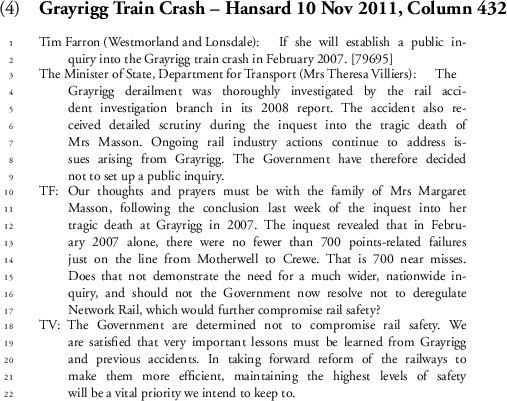
Unlike the written question, the oral supplementary gives the opportunity for the questioner to add factual information intended to persuade the minister of the need to instigate a public inquiry. Here Farron notes that there have been a number of near misses since the death of his constituent in the Grayrigg crash.2 Oral questions also offer the MP the chance to respond to the arguments put forward by the minister for not having an inquiry. For instance, here the Minister for Transport argues that an inquest has already investigated this case and so an inquiry is not needed. Unlike a written question where this argument cannot be challenged, the supplementary suggests there is a systemic problem which a public inquiry could get to the bottom of. We find a similar response to this as we found to the written question previously—asserting that the government is actively seeking to learn lessons from the incident.
On the first point that oral questions are more likely to garner attention, it is to be noted that these sessions are broadcast live on the BBC Parliament channel and online, whilst written questions, by their nature, are published only in Hansard. To this end, written questions might be viewed as inward-facing, whereas oral questions are more outward- or public-facing. Whilst oral questions are accessible to the wider public, this does not mean that they are accessed in large numbers (a 2014 report on BBC Parliament viewing figures stated that nearly 650,000 people watch the channel for on average 45 minutes per week3—which 45 minutes people watch and whether it includes oral questions is impossible to say). However, the proceedings of oral questions frequently find their way into parliamentarian sketchwriters’ pieces in the popular press, or reported on in features or editorials if the newspaper in question is also lobbying for a public inquiry.
2.2.3 Contribution in a Debate
Pressing for an inquiry by contributing to a debate allows the MP to put forward their arguments in favour of such a course of action. Unlike a question, where the amount of information or argumentation that can be put forward is limited, contributing to a debate gives the opportunity to discuss in some detail the reasons for a public inquiry. The deliberative nature of this argumentation is much harder to dismiss with a relatively formulaic response—it requires the responder to unpick the arguments put forward.
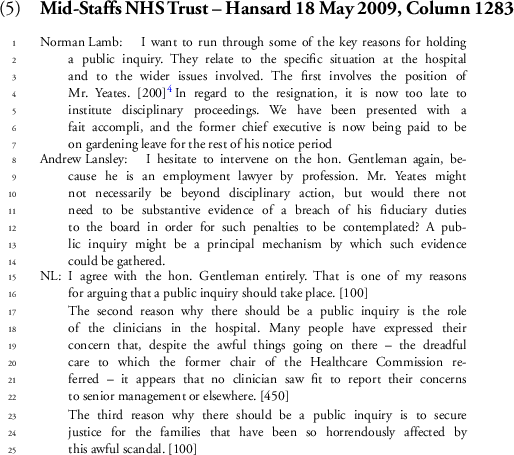
A detailed exposition of the facts and arguments for holding a public inquiry, as we find here in Lamb’s speech, requires more than simply a relatively formulaic dismissal, such as those we have seen previously. Instead, direct responses to (many of) the points made are expected in the wrapping-up speech made by the government minister. If these are not forthcoming, further pressure may be exerted by backbench MPs making interventions on the government minister—interventions which restate the arguments put forward in the course of the debate.
Whilst this type of parliamentary activity does bring pressure to bear on the government, I argue that it is not the strongest forum. There are two reasons for this: (i) any vote (division) called on the back of the debate is unlikely to be binding on the Government—it merely indicates the will of the House, which the executive can choose to ignore; (ii) as before, this type of parliamentary activity is not well-followed amongst the electorate and even if the debate is covered in the press, the specific arguments, which are difficult for the government to respond to, are unlikely to be reported on in any great detail.
2.2.4 Oral Questions at Prime Minister’s Questions
Despite this preparation, the Prime Minister is less able to give the kinds of carefully crafted rejections to requests for undertakings that we saw earlier at ministerial question times. Because the answers are more spontaneous, but with the pressure to minimise face-threat still present (see Murphy 2014: 86ff.), requests for inquiries may be responded to differently:Preparation [for PMQs] would take place the night before and Wednesday morning would be clear, so there was a period of complete absorption, it was limited in duration. By 12.30 p.m. the nightmare was over. (Blair 2010: 108)
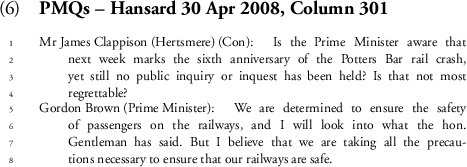
Here an inquiry is not ruled out explicitly—indeed, the Prime Minister says that he will explore this possibility. This leaves open the opportunity for the questioner (and others) to come back to the government and ask again about the possibility for an inquiry—adding to the pressure felt by the executive.
But perhaps the most important reason why we suggest that lobbying in this forum for a public inquiry is particularly pressurising is, as I have mentioned previously, the fact that this is likely to have a great ‘reach’. The full session of PMQs is watched by nearly three-quarters of a million people (figures from BARB) and a round-up of the session appears on both the 6 O’Clock and 10 O’Clock News (reaching a further 5 million viewers in the U.K.). Refusing to hold a public inquiry may damage the positive face of the politician, in that it may cause members of the public to question whether the government has anything to hide (see Murphy 2014: 78, for more on the notion of face in politics). This is all the more serious (i.e. the cost to face is larger), the more people consider this as a possibility.
2.2.5 Staging an Emergency Debate
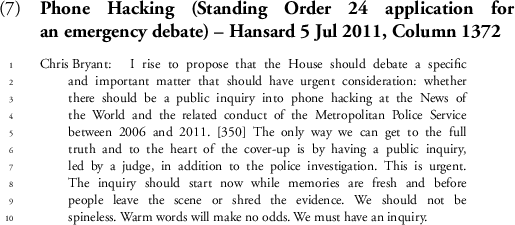
Those wishing to hold an emergency debate are given a three-minute slot in which to make a speech explaining why a debate is necessary. After this, the Speaker asks if the member has the will of the House—those who agree that an emergency debate should be held then stand up and the Speaker decides if a majority of members agree with the motion. If this is the case, then the emergency debate is scheduled, usually the following day and usually for a period of three hours. Proposing an emergency debate does not guarantee that one will be held—the Speaker alone decides whether the application meets the criteria set out in the Standing Order which allows such debates to be held. This is not guaranteed—only four of the last 11 applications for an emergency debate have been approved.
The exceptional nature of an emergency debate, coupled with the fact that it causes embarrassment to the government by derailing their parliamentary timetable, means that it tends to receive a great deal of coverage in the media. As I have argued throughout this section, attention on the cause creates pressure on the government to act. As with ‘ordinary’ parliamentary debate, emergency debates present the proponent of an inquiry with the opportunity to present detailed arguments in support of their position. In addition to this, because the emergency debate requires the will of the House to be held, it is likely that a significant number of MPs wish for an inquiry to be instituted. It is much harder for the Government to turn down such a request if it is common cause across the House, rather than a niche interest (as may be the case with requests for inquiries put forward in written/oral questions and generic debates).
2.3 The Timing of Inquiries
Dates relating to inquiry processes
Inquiry title | Date of the event | Date of the announcement of the inquiry | Date of the inquiry report’s publication |
|---|---|---|---|
Death of Billy Wright | 27/12/1997 | 01/05/2002 | 14/09/2010 |
Death of Bernard Lodge | 28/08/1998 | 10/01/2008 | 15/12/2009 |
The Fingerprint Inquiry (Scotland) | 09/08/2002 | 14/03/2008 | 14/12/2011 |
ICL Plastics | 11/05/2004 | 21/01/2008 | 16/07/2009 |
Al-Sweady Inquiry (Iraq) | May–Sept 2004 | 25/11/2009 | 17/12/2014 |
Death of Azelle Rodney | 30/04/2005 | 30/03/2010 | 30/07/2014 |
This is not to say, however, that the delay between the event and the announcement of the inquiry is the result of the Government seeking to cover up the truth, but rather reflects the exceptional nature of a public inquiry. For instance, the death of Azelle Rodney at the hands of police officers during an armed operation had to first be investigated in a ‘normal’ way. This involves an investigation by the Independent Police Complaints Commission (who investigate all deaths involving police officers), an internal investigation by the police force involved and a standard inquest by the Coroner. It is only after these procedural avenues have been exhausted, and without an acceptable resolution for the interested parties, that an inquiry can even be contemplated. (Indeed, we saw in Examples 3 and 4 that the fact there has been other investigations may be cited as a reason for not establishing a public inquiry.)
Whilst I do not claim that these delays are evidence of the government wishing to cover up the truth, what can be said is that the need for other processes to be completed is often appealed to by ministers as a reason for delaying or denying a public inquiry. Moreover, it indicates the primacy which is given to criminal law to the disadvantage of civil or inquiry-based legal settings. We shall return to this at various points.
2.4 Announcing the Inquiry
- a.
the identity of the inquiry chair
- b.
the identity/identities of further members of the inquiry panel, if needed
- c.
the initial Terms of Reference of the inquiry (a matter which I will return to later in this chapter)
In this respect, the parliamentary statement is performative in Austin’s (1962) sense—i.e. it is only through laying this information before the House that the Secretary of State brings the inquiry into being. In the same category of performative, or the later grouping of declaration suggested by Searle and Vanderveken (1985) are actions such as pronouncing a couple husband and wife, baptising someone and naming a ship. But unlike these acts, there is no set linguistic formula for establishing an inquiry —the action cannot misfire as long as the minister makes a statement containing a reference to points (a) to (c).5

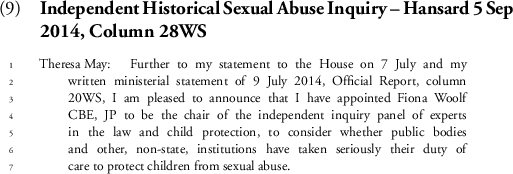
As it happened, the Inquiry has gone through two further chairs. Fiona Woolf was also thought by the victims to be too close to establishment figures who may have been involved in the potential cover-up of institutional abuse. As a result, her chairship was also rescinded and a further performative declaration had to be issued by Theresa May to announce a new chair, New Zealander Justice Lowell Goddard—who in turn stepped down fearing that the inquiry had become too unwieldy. She was replaced by Prof. Alexis Jay—a social work expert—who was put in place by a new Home Secretary, Amber Rudd. This provides us with evidence that who is filling the government role is unimportant—that appointing an inquiry chair is an entirely institutional activity, rather than a personal one.
The announcement establishing the inquiry always takes place publicly first through statements made in the House of Commons. However, discussions may take place in advance of a public announcement with the relevant parties in order to seek assurance that the proposed chair is deemed suitable. The value of these behind the scenes discussions is to avoid the embarrassment caused by having to rescind the inquiry as happened in this case. However, to reiterate what I have said so far—an inquiry can only be established by a government minister making a statement to parliament and it is only in making such a statement that the inquiry is set up. An announcement made elsewhere or by someone who is not a ratified member of the government will misfire, i.e. it will fail to legally establish an inquiry.
2.5 Legitimising the Panel
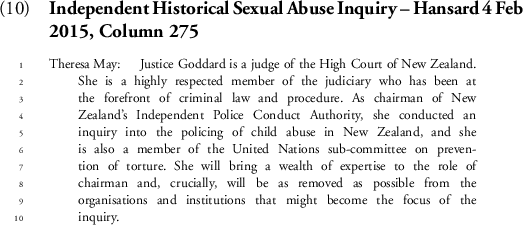
The Home Secretary makes various appeals to ethos when it comes to the appointment of Goddard—i.e. May outlines a number of ways that the new chair is a credible and trustworthy person to conduct the inquiry.6 This is done by listing her professional credentials which show that she is respected in the legal profession (indeed this is asserted in the statement). In addition, a previous, related inquiry in New Zealand conducted by Goddard is cited. These matters act as a warrant for the implicit claim that the selected chair will be suitable for the inquiry (see Toulmin (2003) for more on argumentation).
An interesting point which makes this announcement different from others is the explicit comment that the chair is distant from the organisations which are the focus of the inquiry. I suggest that this arises from the controversy surrounding the appointment of a suitable chair and it was, therefore, necessary to make explicit what may otherwise be left implicit (and indeed, had been left unsaid in the previous announcements).
2.6 The Terms of Reference
Once the inquiry has been established, and if the chair has had to survive any confirmation hearings and/or press/public scrutiny, work on the inquiry itself can begin.7 The first stage of this is confirming or amending the Terms of Reference for the inquiry which were suggested in the parliamentary statement establishing it. Here I present the common features of what public inquiries are tasked to do. I want to particularly highlight here the absence of one task in particular—inquiries are never explicitly tasked with assigning blame, despite what (Beer 2011: 2) suggests that blameworthy conduct is something which inquiries are tasked to identify.

The Terms of Reference make clear what the inquiry is charged with ascertaining, but do not place any restrictions on the chair about how he is allowed to go about doing this—that is, these Terms of Reference do not restrict who he is able to speak to or what evidence he can consider. This is a feature common to all public inquiries. They also do not limit the types of recommendation which can be made as a result of his investigations and which could include a recommendation to blame a certain party or parties (though the Terms of Reference do not commit him to having to make any recommendations). In this section, we will see that this does not hold true for all Terms of Reference.
I base the discussions in this section on the terms of the 25 public inquiries established between 1998 and 2015 (Appendix B provides the full Terms of Reference for the public inquiries which were the object of study in this chapter).
2.6.1 What Are Inquiries Expected to Do?
We shall first consider the Terms of Reference at an abstract, general level by looking at the verbs contained therein and the frequency with which they appear. In looking more closely at the verbs, I will examine what some of them collocate with most frequently, as well as considering their lexical semantics.
The contents of inquiry Terms of Reference
Verb (/light verb construction) | Number of Terms of Reference containing at least one instance |
|---|---|
Recommend/Make recommendations | 17 |
Report | 13 |
Enquire/Inquire | 12 |
Consider | 9 |
Identify | 7 |
Establish | 6 |
Examine | 6 |
Investigate/Conduct an investigation | 6 |
Ascertain | 3 |
The following verbs appeared in the Terms of Reference of just one of the inquiries in question: advise; assess; consult; determine; disclose; liaise; make findings available; oversee; publish; review.
2.6.1.1 Recommend/Make Recommendations
Most Terms of Reference instruct the chair to make recommendations following their consideration of the evidence arising from the inquiry. This instruction is usually hedged, however, with some inquiries asked to ‘make such recommendations as may seem appropriate’ (Litvinenko Inquiry), or in the case of the Shipman Inquiry ‘to recommend what steps, if any, should be taken to protect patients in the future’ (my emphasis). These hedges have a similar function to those found in everyday talk—in this case, they reduce the expectations placed upon the chair in having to devise suggestions for changes in government policy (see Fraser (2010b) for more on hedges, and Fraser (2010a) on hedging in political settings). Moreover, this formulation avoids the potential implicature that a government policy has hitherto been problematic or misguided.
But at the opposite end of the spectrum, we find that the nature of recommendations may be boosted—for instance, the Bristol Royal Infirmary Inquiry was not simply tasked with making recommendations, but rather part of its Terms of Reference was ‘to make recommendations which could help to secure high quality care across the NHS (National Health Service)’. Such a statement is likely to increase the expectations on the inquiry panel.
This is certainly no small feat, but it is one which limits the scope of the recommendations which could have been made by Lord Justice Leveson (the inquiry chair). The expectation set up by the Terms of Reference are such that he would be deviating from them if, say, he offered a recommendation which suggested that ethical standards were unimportant. This restriction on the recommendations, whilst it may emerge from the chair himself in his negotiations with the minister, may have the unintended consequence of giving an impression that the inquiry lacks the necessary independence from government.for a new more effective policy and regulatory regime which supports the integrity and freedom of the press, the plurality of the media, and its independence, including from Government, while encouraging the highest ethical and professional standards
2.6.1.2 Report
The verb report usually appears in the last of the Terms of Reference for each inquiry. Whilst all of the inquiries do produce a report, terms which include reporting may include directives about the nature of the report, to whom the report should be addressed and when the report should be delivered.
Once again, we can see that the Terms of Reference can be used to restrict the work of the inquiry panel—here the panel cannot report, for instance, on the experiences of those who were indirectly affected by the outbreak of the hospital-acquired infection under investigation.report on the experiences of patients and others who were affected directly by the outbreak [...] The inquiry panel should report to the Minister for Health, Social Services and Public Safety, within twelve months of beginning the inquiry, unless otherwise determined by the Minister.
The last two aspects of to whom and when the panel reports are of particular interest. I suggest that they call into doubt the supposed independence of the inquiry. Whilst it is clear that the report will be of interest to the Minister for Health, Social Services and Public Safety and it will be she who is in a place to act on the report’s recommendations, having the inquiry ‘report to’ her is problematic. This particular phrase connotes an unequal relationship—inferiors report to their superiors—to have the inquiry panel set up as being less powerful than the person/people that they are potentially investigating is unlikely to give confidence in the findings of the panel.
This disparity in power is made more explicit in the term stating that the report must be delivered within a year ‘unless otherwise determined by the Minister’ (my emphasis). Specifying a time frame at all limits the scope of the inquiry’s investigations—evidence may not be followed because there is not the time to8—this may affect the quality of the inquiry’s findings. Whilst a seemingly arbitrary deadline is an issue, worse than this is the fact that the Minister can, seemingly at a whim, reduce the time the Inquiry has to investigate. Whilst I do not assert that this has been used to stymie an inquiry, the potential of this caveat is clear—it empowers the Minister over the inquiry panel.

By introducing restrictions on the length of the inquiry, the Minister may be being mindful of these critiques. However, I suggest that a more appropriate way of drawing the inquiry’s attention to the desire for a swift resolution is found in other Terms of Reference—for instance The Cullen Inquiry into the shootings at Dunblane School was instructed to ‘report as soon as practicable’.
This makes salient the need for the inquiry to have due consideration for the time they are spending, but does not impose artificial deadlines—deadlines which the Minister cannot know to be practicable since she cannot know the complexity of the evidence which will come to light in the course of the inquiry.
These criticisms of the Terms of Reference were anticipated by Amnesty International who led a campaign for a repeal of the Inquiries Act 2005, which they argued placed too much power in the hands of the Ministers responsible for setting up an inquiry.9 Whilst I do not argue that this power has been abused by ministers, I would argue that the amount of unchecked control the minister potentially has does not give a good impression for the independence of an inquiry.
2.6.1.3 Verbs of Process
The remaining more frequent verbs found in the Terms of Reference can be placed into one of two groups—verbs of process, which we shall look at here, or verbs of determination, discussed in the next subsection.
The verbs of process—enquire/inquire, consider, examine, investigate/conduct an investigation—introduce what the inquiry will be tasked with exploring and focus on the activity of the panel (rather than its findings, contrast this with verbs of determination). In other words, these verbs instruct the inquiry to explore the matters introduced, but they do not require it to come to a definitive answer to the issues raised.
The individual verbs of process have only subtle differences in meaning, if we consider this from a lexicographic perspective, and these dictionary differences do not seem to play any role in how the inquiry is conducted. I can find no effect of the verb(s) of process used in the Terms of Reference and the way in which the inquiry proceeds, indeed it can be argued that most inquiries are conducted in broadly similar ways. I hope to demonstrate this in the chapters that follow.
- 1.
consider/examine/investigate X
- 2.
inquire/enquire/conduct an investigation into X
- 3.
consider why X
- 4.
consider the extent to which X
- 5.
consider whether X10

In presupposing that there will be implications, the inquiry is framed such that it would be very difficult for it to suggest that there are no consequences of its findings on the relationships. In this respect, the inquiry is tasked not only with finding out the facts relating to phone-hacking and other questionable practices of the press, but also working out what these mean for the future conduct of the press vis-à-vis the police (and other public bodies). This may be viewed as an instance of the inquiry coming to a decision (or being put in a position of deciding) before it has properly explored the facts.

In this case, the inquiry begins from the position that those matters which were not identified and are now the subject of further investigation constitute serious problems. I find (perhaps unsurprisingly) that presuppositions of this nature are seen in the terms of inquiries responsible for finding out the ‘why’ and/or ‘how’ of a situation and not the ‘what’. That is to say, presuppositions about events are only found in inquiries where the facts of those events are widely known about and/or not in dispute. This state of affairs may come about because there has been a previous investigation (as in the case of the Mid Staffs hospital) or because the facts are indisputable (e.g. the fact that lives were lost on Bloody Sunday is presupposed in the terms of that inquiry because this is a matter of public record—how and why these deaths happened is the focus of the inquiry and thus is not presupposed in the Terms of Reference) .


I would argue that, whilst it is possible (or even probable) that the inquiry will find that the failings have been addressed somewhat since the 1960s (the start date for the inquiry’s investigations), it would not be beyond the realms of possibility that the inquiry finds that they have not been addressed at all. There are two possible explanations for this: (i) the presupposition holds but ‘the extent’ has a magnitude of zero; or (ii) hearers use their world knowledge to cancel the presupposition (though the cancellability of presuppositions is controversial, see Gazdar (1979)).
If we go with the former explanation, we still have to account for the fact that the magnitude for ‘the extent’ in the extent to which State and non-State institutions have failed cannot be zero, both because it would be odd to set up an inquiry if that were the case and because of the demonstrative those failings picked up in the following term of reference. To this end, I think these examples provide further evidence that speakers bring their world knowledge to bear on presuppositions.

In this respect, the inquiry is charged with finding out the ‘what’—here if the abuse was identified by institutions or not. This term of reference does not compel the inquiry to investigate anything further (e.g. the ‘how’ or the ‘why’ if failures are uncovered), but it also does not preclude such further investigation.
2.6.1.4 Verbs of Determination
The verbs of determination—identify, establish, ascertain—also introduce the focus of the inquiry. The difference between these and the verbs of process is that they presuppose that the inquiry can and will find an answer to that which they are tasked to investigate.

This type of presupposition may be viewed as framing what ‘success’ looks like for the inquiry. In this case, it would be somewhat justified to deem the inquiry a failure if it failed to determine the number of cases of Clostridium difficile which resulted in death. That would not be the case if establish were replaced with any one of the verbs of process which do not suggest a definitive end point.
This, therefore, relates to the aktionsart of the verbs utilised (Comrie 1976). The verbs of process are atelic activities—they have no clear end point, but are actions that are realised as soon as they start (Garey 1957). The verbs of determination, on the other hand, are telic achievements—they have end points. Their use within the Terms of Reference brings to the fore the idea that the matters under discussion are achievable.

This offers a ‘get out of jail card’ to the inquiry panel—if they fail to establish the matters in question, in this case the facts of organ removal, the inquiry cannot (fairly) be deemed a failure on the basis of this alone.
2.7 Conclusion
This chapter has outlined the complexity involved in establishing a public inquiry. Public inquiries are rarely spontaneous affairs, with the government taking it upon themselves to establish an independent investigation, but rather come about because of external pressure. Lobby groups, represented by MPs and reported upon in the press, campaign vociferously for public inquiries and when other avenues of investigation are exhausted, the government may yield to this pressure and establish an independent inquiry.
The formula for establishing an inquiry is not as strictly prescribed as some institutional routines, and so a parliamentary statement by a ratified government minister which includes details of some outline Terms of Reference and an inquiry chair is a performative action.
The final Terms of Reference may change upon negotiations with the inquiry chair but their key features include: a statement outlining what will be the focus of the investigation and a directive to report and/or make recommendations on the basis of these inquiries. I hope to have shown that the phrasing of the Terms of Reference plays an important role in the framing of a public inquiry—they frequently contain within them presuppositions which lead the inquiry in a particular direction for investigation, and also set the parameters for what a successful inquiry will look like upon completion.
Restrictions may be placed on the inquiry in a variety of ways—including, but not limited to, what can be explored, what sorts of recommendations can be made and how long the inquiry can run. These limitations are coupled with the fact that the establishment and the (premature) disbanding of an inquiry are powers which lie with the government. These issues lead us to the view that public inquiries lack true independence from executive power. This opens up questions about how probable it is that a government would establish an inquiry for events for which they were to be blame.

